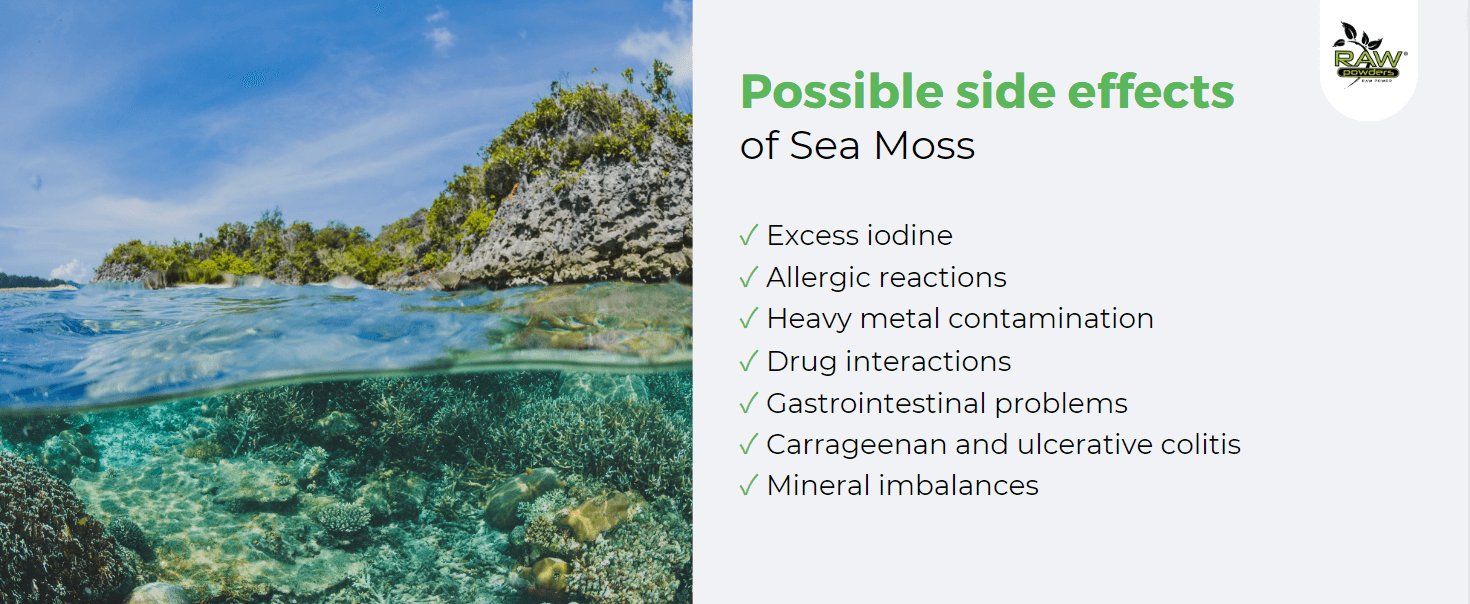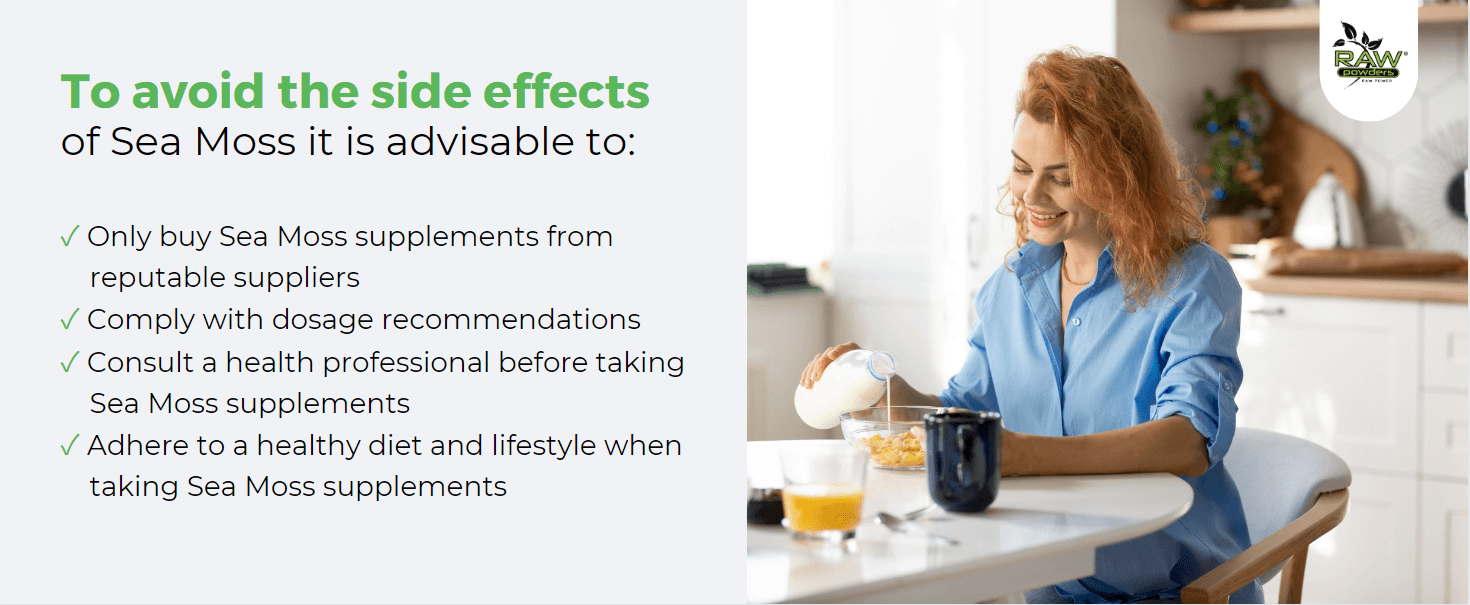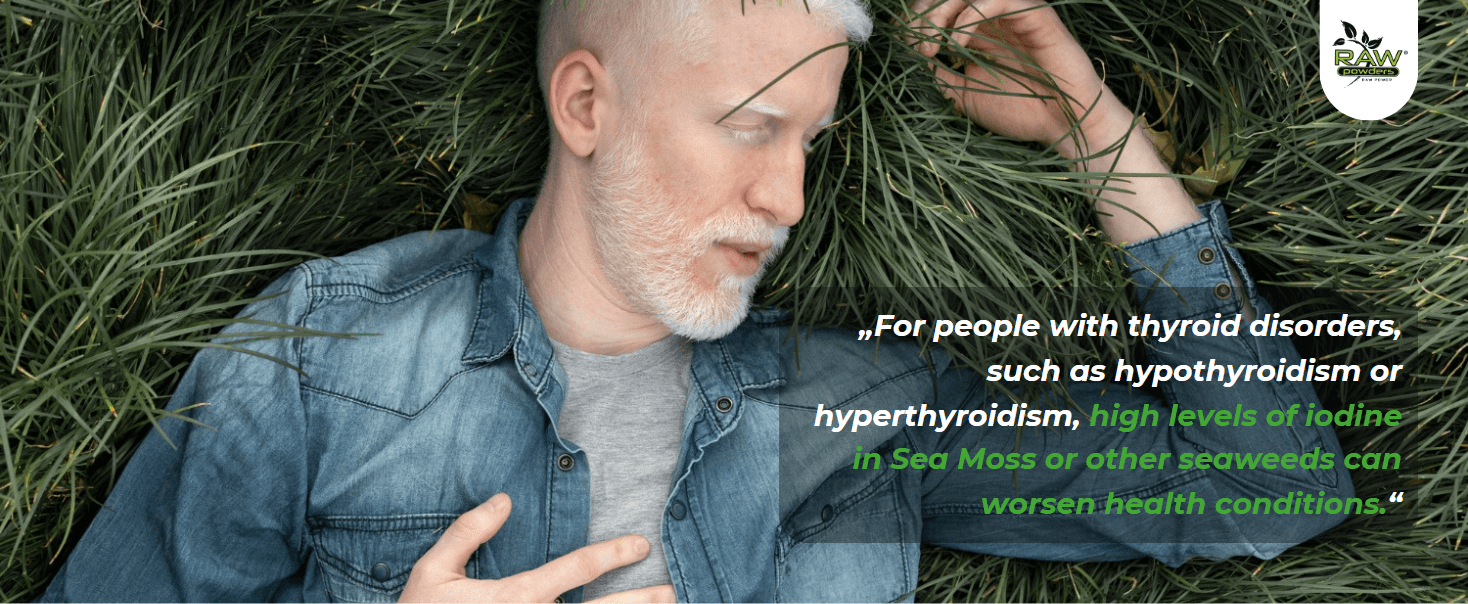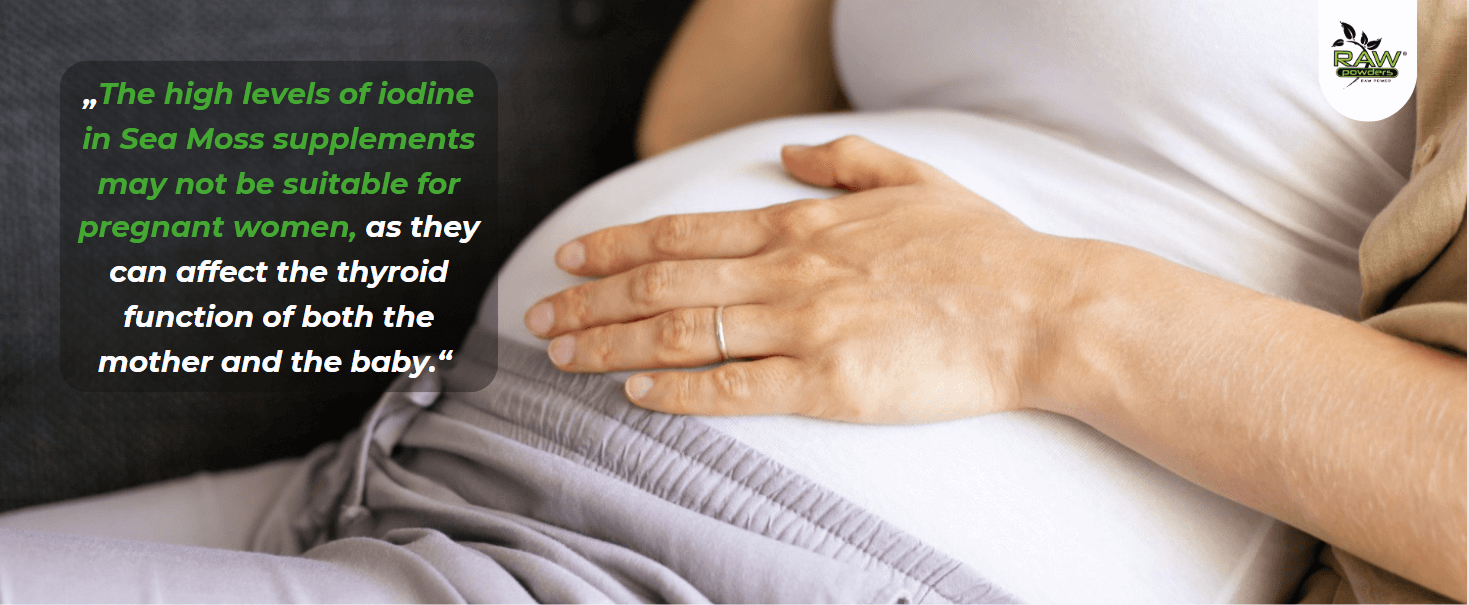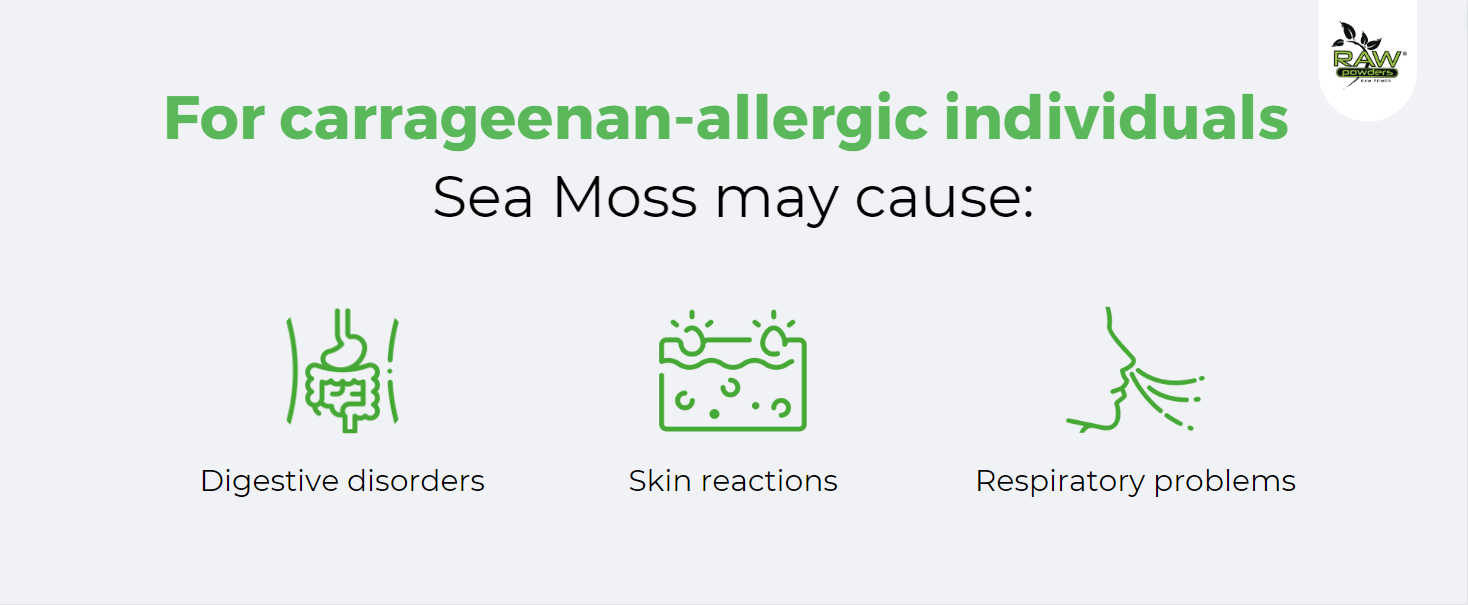SEA MOSS SIDE EFFECTS: WHAT YOU SHOULD KNOW

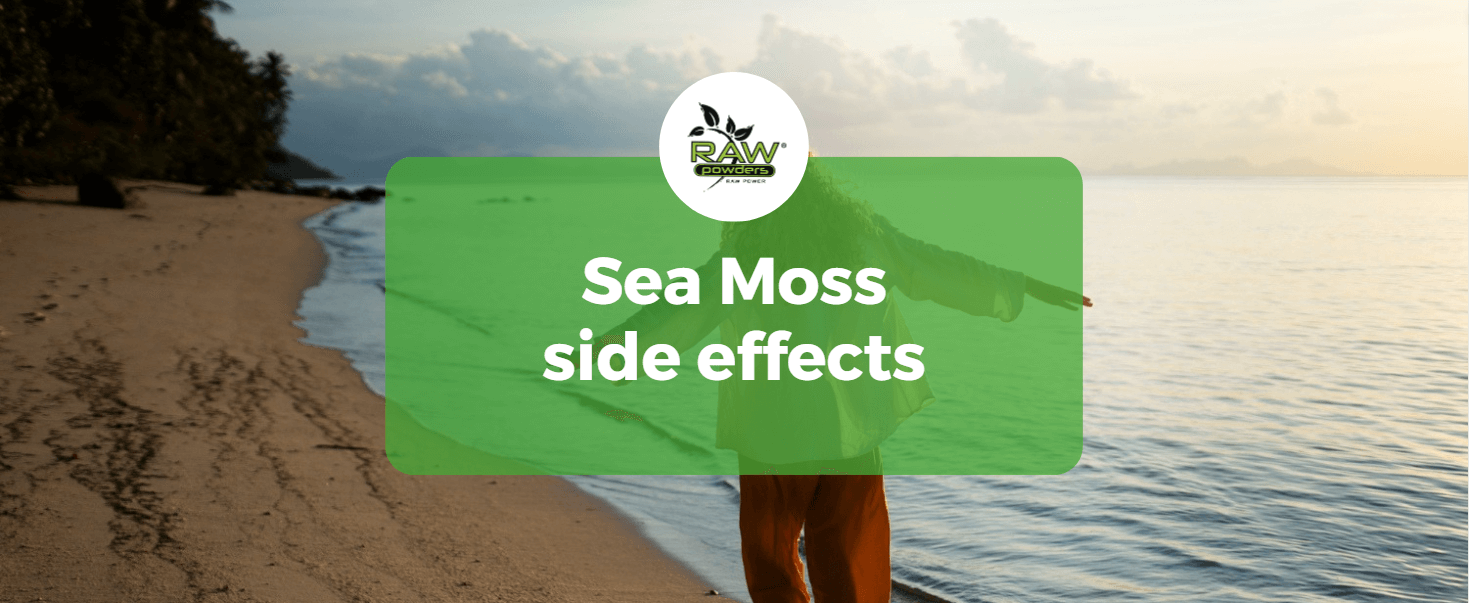
Sea moss, also known as Irish moss or cartilage seaweed, is generally considered safe and nutritious, but like any supplement, it can have side effects, especially if consumed in large amounts or by individuals with certain health conditions. While it is often used by individuals without pre-existing conditions, it is crucial to adhere to recommended dosages of Irish Moss.
Here are some potential side effects of sea moss:
- Iodine Overload: Sea moss contains a significant amount of iodine, which is essential for thyroid function. However, excessive iodine intake can lead to thyroid dysfunction, either hyperthyroidism or hypothyroidism, especially in individuals who are sensitive to iodine or already have thyroid issues [1].
- Allergic Reactions: Some people may be allergic to sea moss or other seaweeds. Research on allergic reactions to sea moss is limited, but it is known that some individuals may experience allergies. Common symptoms of a sea moss allergy can include itching, hives, swelling, and difficulty breathing, and in severe cases, it can lead to anaphylaxis. It's important to note that an allergy to sea moss is different from a shellfish allergy, as they involve different allergens. If you have a known allergy to shellfish or other seafood, it's recommended to be cautious with sea moss and consult a healthcare professional before adding it to your diet. More research is needed to fully understand the potential risks and benefits of sea moss [2].
- Heavy Metal Contamination and Regulation: Seaweeds, including sea moss, have the capacity to absorb and accumulate heavy metals such as mercury, lead, cadmium, and arsenic from their growing environment. This potential risk varies based on the quality of the water in which they grow. It's important to note that in legal food products, especially within the European Union, there are strict controls and regulations in place to monitor and limit the levels of these heavy metals. This ensures that sea moss and similar products meet safety standards before they are available for consumption [3].
- Drug Interactions: Sea moss might interact with certain medications, such as blood thinners, due to its high vitamin K content. It's always advisable to consult with a healthcare provider before starting any new supplement, especially if you are taking other medications [4].
- Gastrointestinal Issues: In some people, sea moss can cause bloating, stomach upset, or diarrhea, especially when consumed in large quantities [5].
- Carrageenan and Ulcerative Colitis: Carrageenan, a component of sea moss, has been associated with exacerbating symptoms in patients with ulcerative colitis. Avoiding dietary carrageenan may benefit these individuals [6].
- Mineral Imbalance: Excessive consumption of sea moss might lead to an imbalance of minerals in the body, as it is high in potassium, calcium, and magnesium [7].
Remember, moderation is key, and if you have specific health concerns or conditions, it's best to consult with a healthcare professional before incorporating sea moss or any new supplement into your diet.
Sea Moss side effects prevention: Comprehensive guidelines for safe consumption
Sea Moss, a nutrient-rich superfood, can be a valuable addition to one's diet. However, to ensure its benefits are enjoyed without adverse effects, it's important for individuals, particularly those in good health and without pre-existing conditions, to adhere to certain guidelines:
- Purchase Sea Moss from Reputable Sources: Quality is key when it comes to supplements. Opt for Sea Moss products from trusted suppliers who provide transparent information about sourcing, processing, and packaging. This reduces the risk of contamination with heavy metals or other pollutants often found in seawater. Look for certifications or third-party testing that ensure product purity and safety.
- Follow Dosage Recommendations Closely: Overconsumption can lead to various side effects. It's essential to adhere to the recommended dosage provided on the product label or as advised by a healthcare professional. This ensures that you receive the benefits of Sea Moss without overloading your system with nutrients like iodine. For more information on Sea Moss benefits, effects and dosage and usage recommendations, see the blog: Sea Moss benefits and Sea Moss dosage.
- Consult a Doctor Before Use: This is particularly crucial for those with thyroid disorders, allergies, or who are taking other medications. A healthcare provider can offer advice tailored to your specific health needs and conditions, ensuring that Sea Moss supplements won't interfere with existing health issues or medications.
- Start with the Lowest Dose and Monitor the Body's Response: Each individual's reaction to supplements can vary. Begin with a smaller dose than recommended and observe how your body reacts over a few days or weeks. This approach helps in identifying any adverse reactions early and in adjusting the dosage accordingly.
- Avoid Exceeding the Maximum Daily Dose: Stick to the recommended limits to avoid potential side effects like gastrointestinal issues or iodine overload. Exceeding the daily dose doesn’t necessarily enhance the benefits but can increase the risk of adverse reactions.
- Maintain a Healthy Diet and Lifestyle When Taking Supplements: Supplements should complement, not replace, a balanced diet. Ensure you're consuming a variety of nutrients from whole foods. A healthy lifestyle, including regular exercise, adequate hydration, and stress management, further maximizes the benefits of Sea Moss while minimizing potential risks.
By following these guidelines, individuals can enjoy the health-promoting properties of Sea Moss with minimal risk of side effects. It's about informed and mindful supplementation, taking into account one's unique health profile and needs.
Special considerations: Navigating Sea Moss use with care
While Sea Moss is a beneficial supplement for many, there are specific circumstances where extra caution is advised:
1. Thyroid Disorders:
- The Iodine Factor: Sea Moss is rich in iodine, a mineral crucial for thyroid health. However, for individuals with thyroid disorders such as hypothyroidism or hyperthyroidism, the high iodine content can exacerbate their condition. Too much iodine can disrupt thyroid function, potentially leading to an imbalance in thyroid hormones.
In one study it was analyzed the iodine level in 30 samples of red seaweeds, and Irish moss (3.86 ± 1.49 mg/kg dry weight) has the highest average iodine content. Four grams per day of analyzed dehydrated Irish moss seaweeds contributed greatly to the iodine recommended daily intake (DRI) for children (25.7%). The consumption of analyzed seaweeds (4 g/day) does not pose a health risk. However, the consumption of 286 g/day of Irish moss would lead to exceeding the UL for the adult population set at 1100 μg/day. It is necessary that the consumer respects the consumption guidelines of the seaweed packers [8]. - Consultation is Key: It's imperative for those with thyroid conditions to consult with a healthcare specialist before incorporating Sea Moss into their diet. A healthcare provider can assess the appropriateness of Sea Moss in the context of the individual's specific thyroid condition and overall health status.
- Monitoring Thyroid Levels: For those who choose to consume Sea Moss under medical guidance, regular monitoring of thyroid function and iodine levels is advisable to ensure that the supplement does not adversely affect their condition.
2. Pregnancy and Breastfeeding:
- Caution During Pregnancy: During pregnancy, the body's nutritional needs change significantly. While some supplements can be beneficial, the high iodine content in Sea Moss may not be suitable for pregnant women, as it could affect both the mother's and the baby's thyroid function.
- Breastfeeding Considerations: Similarly, for breastfeeding mothers, supplements taken can affect the composition of breast milk. Therefore, it's essential to consult a doctor before taking Sea Moss to ensure it doesn't harm the infant.
- Individualized Advice: A healthcare provider can offer personalized advice based on the individual's dietary needs and health status during pregnancy and lactation.
3. Allergy to Carrageenan:
- Understanding Carrageenan Allergy: Carrageenan is a substance derived from red seaweed, like Sea Moss, and is commonly used as a food additive. Some individuals may have an allergy or sensitivity to carrageenan, which could trigger adverse reactions [6].
- Recognizing Symptoms: Symptoms of carrageenan allergy can include digestive issues, skin reactions, and respiratory problems. If you have a known allergy to carrageenan, consuming Sea Moss might trigger similar reactions.
- Preventive Measures: The safest course of action for those with a carrageenan allergy is to avoid Sea Moss and products containing it. Always check ingredient labels for carrageenan or Sea Moss extracts, especially in dietary supplements and processed foods.
In accordance with EFSA (European Food Safety Authority) opinion about safety of carrageenan, the review found that carrageenan doesn’t get absorbed into the body as is and is safe at high levels in rats, without causing cancer or genetic damage. The safety of processed Eucheuma seaweed is similar to carrageenan, and there's enough data for most food types. But, there are some uncertainties about their makeup, effects, and exposure. So, the current safe daily intake for these additives is set as a temporary guideline. More research is needed within 5 years to clear up these uncertainties [9].
In conclusion, consulting healthcare professionals and adhering to their guidance ensures that the consumption of Sea Moss is safe and beneficial not only for specific groups with various medical conditions but for every individual that consumes Sea moss as their diet supplement.
Medical Disclaimer
The information provided in our articles is solely for educational purposes and should not be considered medical advice or instruction. No action or inaction should be taken based solely on the contents of this information. Readers should consult their health care professional on any matter related to their health and well-being. The information and opinions provided here are believed to be accurate and sound, based on the best judgment available to the authors, but readers who fail to consult with appropriate health authorities assume the risk of any injuries. The publisher is not responsible for errors or omissions.
Please be aware that different countries may have specific regulations and that this disclaimer does not replace the need for consultation with a healthcare provider before beginning or changing a treatment or supplement regimen. The information contained in this article is not intended to diagnose, treat, cure, or prevent any disease. Individual results may vary.
References
- Francesco Latrofa, Emilio Fiore, Teresa Rago, Lucia Antonangeli, Lucia Montanelli, Debora Ricci, Maria Annateresa Provenzale, Maria Scutari, Monica Frigeri, Massimo Tonacchera, Paolo Vitti. Iodine Contributes to Thyroid Autoimmunity in Humans by Unmasking a Cryptic Epitope on Thyroglobulin. The Journal of Clinical Endocrinology & Metabolism, Volume 98, Issue 11, 1 November 2013, Pages E1768–E1774, https://doi.org/10.1210/jc.2013-2912.
- Iason Thomas, Leonard Q. C. Siew, Timothy J. Watts, Rubaiyat Haque. Seaweed allergy. Case Reports: J Allergy Clin Immunol Pract. 2019 Feb;7(2):714-715. doi: 10.1016/j.jaip.2018.11.009. Epub 2018 Nov 22. PMID: 30471363. https://pubmed.ncbi.nlm.nih.gov/30471363/.
- EFSA. Chemical contaminants in food and feed. Last reviewed date: 10 January 2024. https://www.efsa.europa.eu/en/topics/topic/chemical-contaminants-food-feed.
- Ji Na Park,Ji Sun Lee, Min Young Noh, Mi-Kyung Sung. Association Between Usual Vitamin K Intake and Anticoagulation in Patients Under Warfarin Therapy. Clin Nutr Res. 2015 Oct; 4(4): 235–241. Published online 2015 Oct 31. doi: 10.7762/cnr.2015.4.4.235. PMCID: PMC4641985. PMID: 26566518. https://www.ncbi.nlm.nih.gov/pmc/articles/PMC4641985/.
- James W. Anderson, Pat Baird, Richard H. Davis Jr, Stefanie Ferreri, Mary Knudtson, Ashraf Koraym, Valerie Waters, Christine L. Williams. Health benefits of dietary fiber. Nutr Rev. 2009 Apr;67(4):188-205. doi: 10.1111/j.1753-4887.2009.00189.x. PMID: 19335713. https://pubmed.ncbi.nlm.nih.gov/19335713/.
- Sumit Bhattacharyya, Theresa Shumard, Hui Xie, Amar Dodda, Krista A. Varady, Leo Feferman, Allan G. Halline, Jay L. Goldstein, Stephen B. Hanauer, Joanne K. Tobacman. A randomized trial of the effects of the no-carrageenan diet on ulcerative colitis disease activity. Nutr Healthy Aging. 2017 Mar 31;4(2):181-192. doi: 10.3233/NHA-170023. PMID: 28447072 PMCID: PMC5389019. https://pubmed.ncbi.nlm.nih.gov/28447072/.
- Maria Nieves Garcia-Casal, Robin Mowson, Lisa Rogers, Ruben Grajeda. Risk of excessive intake of vitamins and minerals delivered through public health interventions: objectives, results, conclusions of the meeting, and the way forward. Ann N Y Acad Sci. 2019 Jun;1446(1):5-20. doi: 10.1111/nyas.13975. Epub 2018 Oct 5. PMID: 30291627. https://pubmed.ncbi.nlm.nih.gov/30291627/.
- Javier Darias-Rosales, Carmen Rubio, Ángel J. Gutiérrez, Soraya Paz, Arturo Hardisson. Risk assessment of iodine intake from the consumption of red seaweeds (Palmaria palmata and Chondrus crispus). Environ Sci Pollut Res Int. 2020 Dec;27(36):45737-45741. doi: 10.1007/s11356-020-10478-9. Epub 2020 Aug 15. PMID: 32803579. https://pubmed.ncbi.nlm.nih.gov/32803579/.
- Peter Aggett, Fernando Aguilar, Riccardo Crebelli, Birgit Dusemund, Metka Filipič, Maria Jose Frutos, Pierre Galtier, David Gott, Ursula Gundert‐Remy, Gunter Georg Kuhnle, Claude Lambré, Jean‐Charles Leblanc, Inger Therese Lillegaard, Peter Moldeus, Alicja Mortensen, Agneta Oskarsson, Ivan Stankovic, Ine Waalkens‐Berendsen, Rudolf Antonius Woutersen, Matthew Wright and Maged Younes. Re‐evaluation of carrageenan (E 407) and processed Eucheuma seaweed (E 407a) as food additives. EFSA Journal 2018;16(4):5238. European Commission (EFSA-Q-2011-00508, EFSA-Q-2011-00509). https://doi.org/10.2903/j.efsa.2018.5238.





_front%20(1)-250x250.png)



_front%20(1)-250x250.png)

-(NN)_front%20(1)-min-250x250.png)

_front%20(1)-250x250.png)


_front%20(1)-min-250x250.png)
_front%20(1)%20(1)-250x250.png)

_front%20(1)%20(1)-250x250.png)
_front%20(1)-250x250.png)
_front%20(1)-min-250x250.png)
